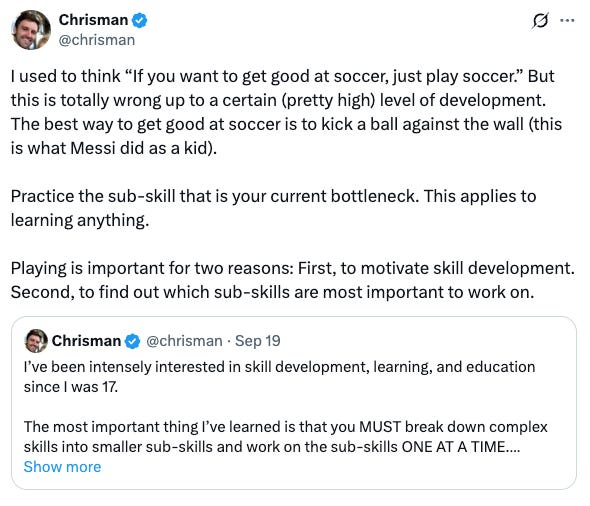Books are not fungible
This post was originally a long tweet. But once I finished writing it, I realized it is also a short essay. So here you go.
Books are not fungible. Different kinds of books are necessary to maintain a regular, skilled reading habit.
Using scarce time to only read "important books" often backfires into no reading at all, because the habit and skill of reading is built by reading "less important," "fun," and even "trashy" books.
The "important books" are often not that easy to read. They are not short, have strange syntax to the contemporary ear (especially if they're old), and likely introduce many new words and ideas.
Imagine if you said "I'm very busy, so I will only lift the heaviest possible weights in the gym when I get a chance to go, and I will not use my available time for any other exercise."
In the first place, you are throwing out the straightforward basis of any important fitness routine: walking a decent amount. In the second place, you're setting yourself up for an injury that will keep you out of the gym totally. Successful strength training involves form, progressive overload (not instant, overwhelming overload), readjustments, and rest.
But many aspiring readers do the book equivalent of "walk into the gym for the first time as an adult, try to deadlift 500 pounds, pull and hurt everything, be unable to work out well" by going from no reading habit to The Power Broker or something.
A reading habit, or a life filled with regular reading, has more than "important books." There are "fun" books, "interesting" books, even "trashy" books. Some of these are very easy to read, and there is little friction to picking them up and finishing them. You might think they don't do anything for you, but, at minimum, they keep up the actual physical habit of handling books and running your eyes over them successfully. They train your body to focus on the book as an object by holding your focus with their fun. People underweight that reading is a significantly physical practice, not just mental.
Also: the "important books" are not actually all books that are important. Books of all kinds are important, and can transform the lives of those who read them. Most would-be readers that try to optimize scarce time for "important books" don't realize they've unconsciously written off almost everything that's been written, which also means they've written off the book equivalents of walking, learning correct form, recovery/rest, and progressive overload. They have set themselves up to, yet again, pick up a brick of a book, get two chapters in, and then that's it.
If you like solving problems and thinking in systems, you *could* read something like The Art of Doing Science and Engineering by Richard Hamming. Or you could shift down and read Surely You're Joking, Mr. Feynman!. Or you could shift further down and read a techno-thriller by Michael Crichton, like Jurassic Park, Airframe, or The Andromeda Strain. These techno-thrillers present compelling narrative, great ideas to ponder, and are easy to read. Airframe, for example, centers on a few intense days of aircraft manufacturer employees (primarily one quality assurance vice president) trying to figure out why an airplane had such a strange physical failure. Most of the book is about the problem solving, the technical detail and history of aircraft, and other things to delight a scientific, systems-oriented mind. But it's in a compelling narrative package!
Some postscriptum
[By "downshift" above I mean moving toward books that are less dense, more narrative, and more plot-driven.]
[Indeed, it was The Andromeda Strain that gave me the technical idea to compare government policymaking to disease treatment. Many books offer many things! Reading widely beats reading sparingly almost every time.]
[And if techno-thrillers and hard science fiction aren’t your fancy, then get a “hard fantasy” book with a stringent, rules-based magic system. Or you could just read Twilight and have fun with that—but get with the reading program!]
[Also, a relevant tweet below]
Thank you to Austin, conversation with whom prompted me to write this.



Adding to this, I think it’s also really important to read books outside of your direct field of work. Read fiction will make you a stronger writer and add flare to one’s non fiction writing (plus it’s fun!) And the marginal utility of reading books outside of your immediate field can be a lot higher since those books will encompass ideas far outside those one might usually encounter. So it’s all about finding the right balance.